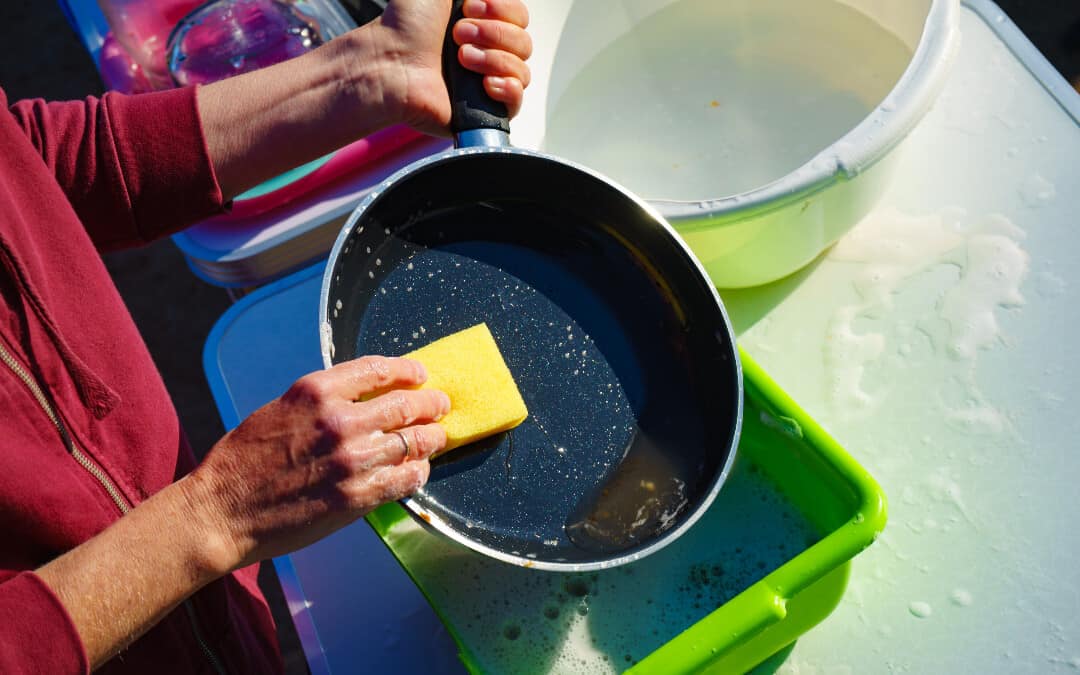When you’re camping, the thought of doing dishes is probably the last thing on your mind. But if you want to enjoy your trip, you’ll need to do something about the skillets, plates and cups you use to eat and drink with. If you don’t properly clean up after each meal, you risk attracting wild animals and insects. Fortunately there are several easy ways to wash dishes when camping, and you won’t even need a sink or running water for some techniques. Below we’ll look at some easy tips on how to wash dishes while camping.
Contents
Planning Before Your Meal to Avoid Extra Dish Cleanup
You can plan your meals to use the least amount of dishes, but that requires forethought. There are two easy ways to do this: Use separate plates and bowls for each of your meals. Take one plate to the campground and wash it. Prepare your food in the same way you would at home, including items such as silverware and knives. Take the dishes from one meal and wash them. You can use a camping sink, if there is one. Alternatively, you can wash in the sink at the campground. Once clean, rinse them under running water and reuse them for your next meal. Find a Camping Rivet If you don’t have access to a campground sink, you can wash dishes by placing them in a nylon storage pouch and then filling it with water. There are several ways to do this.
How to Wash Dishes While Camping – The Essentials
Many of us probably don’t think about what we’re doing when we wash our utensils after a long day of travel. Yet, there are several essential cleaning steps you can take to ensure food, dishes, and utensils are squeaky clean after a trip to the campsite. That being said, here are some essential camping cleaning steps you’ll need to follow to help your dishes stay clean for the rest of your trip. Disposable Dishwashing and Detergent Gels While water is probably your first choice for dishes, it’s not the most practical option for all campsites. Especially in colder temperatures, a lot of campsites are located in remote areas or don’t have reliable water sources nearby.
Washing Your Dishes in Buckets with Water
Using a bucket filled with water, put the dishes you want to wash in. Place the lid on the bucket so it’s sealed and it’s the same height as the stove. Place the dishes into the water, and let them soak for a few minutes. After a few minutes, flip each dish over and rinse with the water from the bucket. Once you’ve rinsed and dried the dishes with a towel, store them in a container with a lid that closes tightly. Washing Dishes While Camping with Compost To wash dishes without a sink, use some organic materials to wash with. Using cardboard, natural fibers, seaweed, cheese, berries, veg peelings or grass is a great way to clean up your dishes. To begin, wrap some of the materials around a pot or a bowl, then pack it into the water.
Washing Your Dishes with Antimicrobial Wipes
When learning how to wash dishes while camping, you may come across the debate of water vs. wipes. Cleaning can be hard to do without a sink or running water, so one of the best ways to do it is with antimicrobial wipes. Most people think of these as cleaning wipes for countertops, but they’re a perfect choice for doing dishes when you’re camping. They kill more than 99.9 percent of all bacteria, including dangerous germs like E. coli. It’s important that you do this before each meal so you kill germs and then rinse them away. You can buy these wipes in the supermarket or in camping stores, and they come in all different kinds.
Washing Your Dishes with Paper Towels
When you’re camping and don’t have access to running water, paper towels can be your best friend. A set of six paper towels costs a few bucks, but it’ll last you for years. Pack a couple extra paper towels to dry with. Some campsites might not have a sink or running water, but you can easily find out if there’s a tap at the campsite. Here’s how to wash dishes while camping with paper towels. You’ll need about a cup of water for each paper towel, or until the paper towels are wet. If you don’t have the water, you can always pour a cup of your water on the paper towels. Tear off a bunch of paper towels to give them a quick wipe, then throw them away. To remove food from your dishes, either wipe with a wet paper towel or run your dish brush under cold water and scrape off the food with the bristles.
Sterilizing & Sanitizing Your Dishes
If you’re camping in an area without a laundry facility, you might want to use the dishwasher in your camper. If you’re working in close quarters, there’s no reason you can’t use a camping dishwasher, but you’ll want to sterilize your dishes before putting them in. When Camping With Pets: How To Keep Your Pets Hydrated During Long Camping Trips You can also put your plates and skillets in a larger plastic bowl and place it outside, to stay clean and help protect against any animals. However, that’s not a perfect solution, and it might not work if the bowl is sitting on the ground. Plus, if you have a dishwasher, you might consider using it, especially if you want to wash larger quantities of dishes.
Tips to Make Washing Dishes & Gear Easier
Think Outside the Bowl: When your dishes aren’t in a bowl or dishwasher, they’re easy to splash or spill. In order to properly clean your dishes and utensils, take them outside to a sturdy, flat surface. Most cookware and bowls can be wiped off and dried on the ground. Wooden plates can also be easily scrubbed clean with a pumice stone, although it may require a little elbow grease. Carve out some time to get your dishes and utensils cleaned up after each meal. There’s a good chance they’ll get a lot worse if you wait until the last minute. Doing dishes while camping is a little bit of work, but it’s the small things in life that make a difference. And when you do it all from the comfort of your tent, you won’t even have to worry about packing up and leaving.


0 Comments